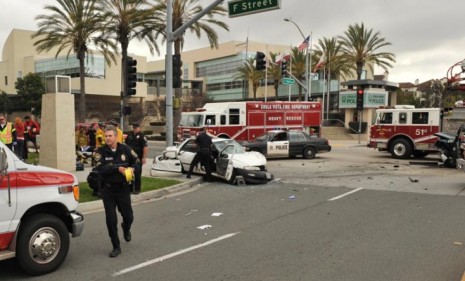Stoned drivers: As bad as drunk drivers?
New data reveals that many drivers get behind the wheel after smoking pot, spurring calls for the cannabis equivalent of a blood-alcohol test

A free daily email with the biggest news stories of the day – and the best features from TheWeek.com
You are now subscribed
Your newsletter sign-up was successful
Drunken driving is still a major problem — alcohol was a factor in 32 percent of U.S. traffic-related deaths in 2009 — but drugged driving is on the rise, too. New data from the National Highway Traffic Safety Administration says many drivers are impaired by legal and illegal drugs, and marijuana is especially prevalent. From 1999 to 2009, the number of car crash fatalities where drugs were the primary cause, and no booze was involved, jumped by 55 percent. Here, a brief guide:
What have studies found about drugged drivers?
Sixteen percent of drivers stopped randomly in nighttime checks nationwide were impaired by legal or illegal drugs, according to a government tally. Roughly half of those impaired were under the influence of marijuana. And 33 percent of drivers in fatal crashes were under the influence of drugs. In California, some 1,000 car accidents and fatalities are blamed on drugged drivers each year. Law enforcement officials blame the rise of medicinal marijuana, which is legal in the state. "Marijuana is a significant and important contributing factor in a growing number of fatal accidents," says Gil Kerlikowske, the director of National Drug Control Policy.
The Week
Escape your echo chamber. Get the facts behind the news, plus analysis from multiple perspectives.

Sign up for The Week's Free Newsletters
From our morning news briefing to a weekly Good News Newsletter, get the best of The Week delivered directly to your inbox.
From our morning news briefing to a weekly Good News Newsletter, get the best of The Week delivered directly to your inbox.
What are police doing about this?
While medicinal marijuana is legal, to some degree, in 16 states, most don't have a strict standard for the level of pot allowed in a driver's system. "We are not nearly to the point where we are with alcohol," says Jeffrey P. Michael with the National Highway Traffic Safety Administration. "We don't know what level of marijuana impairs a driver." Officers typically administer a 12-part exam to determine a driver's level of intoxication, based on their blood pressure, pulse, pupil dilation, and coordination. But there's no clear line, as there is with drinking and blood-alcohol levels.
How about a zero-tolerance policy for driving drugged?
Thirteen states do have zero-tolerance laws. But most, including California, simply rely on police officers to determine a driver's level of impairment. Zero tolerance is also somewhat complicated, as marijuana remains in the system for days and weeks. It's unclear how low levels of residual pot might impair a driver, if at all. Marijuana advocates worry that police might test drivers days or weeks after they last used marijuana. "Marijuana is not nearly as well understood as alcohol, which has been the subject of statistical and medical research for decades," says Ralph Vartabedian in the Los Angeles Times.
A free daily email with the biggest news stories of the day – and the best features from TheWeek.com
So, what now?
There are plenty of ongoing studies on the effects of marijuana on drivers. In Virginia Beach, Va., $6 million is being spent to prove that drivers with drugs in their systems are more likely to crash. The Office of National Drug Control Policy, the National Institute of Drug Abuse, and the National Highway Traffic Safety Administration are working together on a nationwide campaign to address the issue. Someday, scientists hope to be able to determine if a driver is under the influence of marijuana with a simple saliva swab test, but that will take years of research. Until then, police officers will have to rely on their judgement... as they did with alcohol decades ago.
Sources: Boston Herald, CDC, LA Times, Slate

